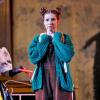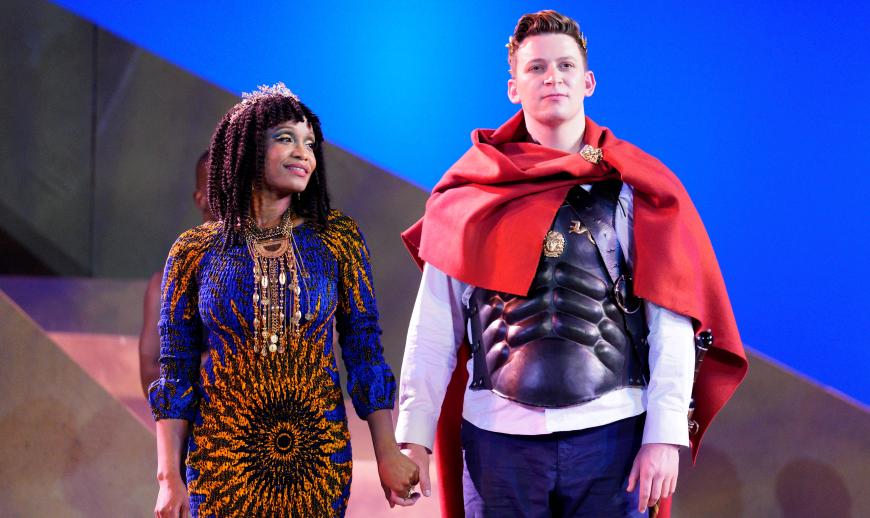
The love affair of Julius Caesar and Cleopatra — the austere Roman seduced by the vibrant Egyptian, first plotting to use him to get her brother Ptolemy off the throne and then, to her (and Caesar’s) surprise, falling in love — is the stuff of opera. Baroque composers adored its combination of intrigue and sex (extramarital, to add even more fizz to the mix). There were almost a dozen operas on the story in the half-century before Handel took it up in 1724. While the others are largely forgotten, Julius Caesar (Giulio Cesare) became arguably Handel’s greatest opera.
In West Edge Opera’s current production, the four lead roles came across vividly. Caesar was sung by countertenor Aryeh Nussbaum Cohen, whose powerful, nimble, and expressive voice is familiar to local concertgoers. Caesar begins as a brash soldier on the rise (in the first scene, having defeated his rival Pompey, he brags, “I came, I saw, I conquered”). But he has a lot to learn, and Cohen showed us a Caesar increasingly faced with evil, sorrow — and love. Particularly moving was his meditation on the transience of life, “Alma del gran Pompeo” (Soul of great Pompey) — a beautiful scene for which Handel must have been inspired by Shakespeare.
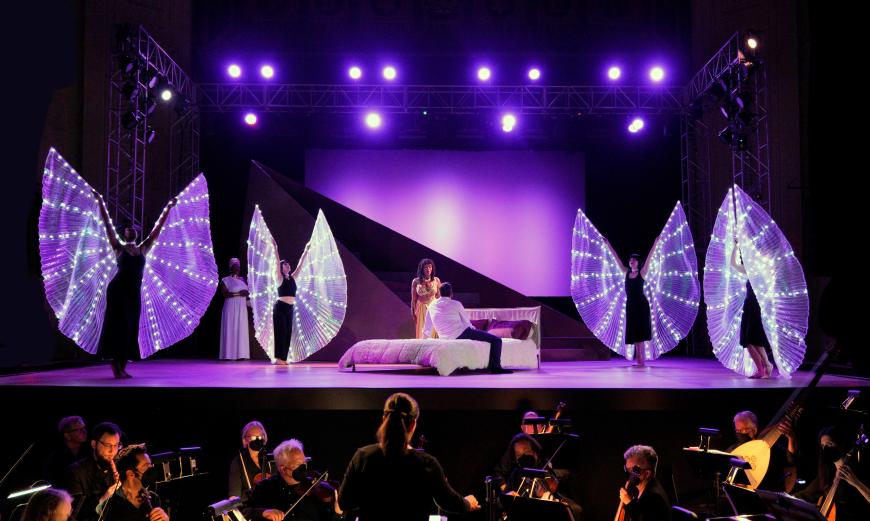
Coloratura soprano Shawnette Sulker — whom I last heard two years ago at Ars Minerva — seemed made for Handel’s multifaceted Cleopatra. While not in full voice at the beginning of Sunday’s performance, Sulker went on to shape a heroine full of intelligence and pizzazz. Her showstopping seduction aria, “V’adoro, pupille” (I adore your eyes), was gorgeous, particularly in being accompanied by four elegant dancers with glowing LED “wings.” Perhaps most powerful was Cleopatra’s famous “Piangerò” (I will weep). She mourns that both power and love have been taken from her in one stroke and believes her death is near, but her melancholy is suddenly and brilliantly transformed by the promise of revenging her death as a ghost.
Handel balances the two main characters in a secondary plot graced with some of his finest music. Pompey’s widow Cornelia was movingly sung by mezzo-soprano Katherine Pracht, heard recently in West Edge’s production of Kevin Puts’s Elizabeth Cree. A high point of Cornelia’s many woeful moments was a duet with her teenage son Sesto, “Son nata a lagrimar” (I was born to weep). Throughout, mother and son are repeatedly — though finally unsuccessfully — harassed by the evil Ptolemy (acted with appropriate nastiness by countertenor Cenk Karaferya). As the young, impetuous Sesto, mezzo-soprano Sarah Coit — a West Edge Opera regular — dazzled. Deft in the brilliant fast notes of the boy’s many “action arias,” Coit excelled in conveying the trajectory of anger, sorrow, and resolve that finally leads to Sesto’s killing Ptolemy at the climax.
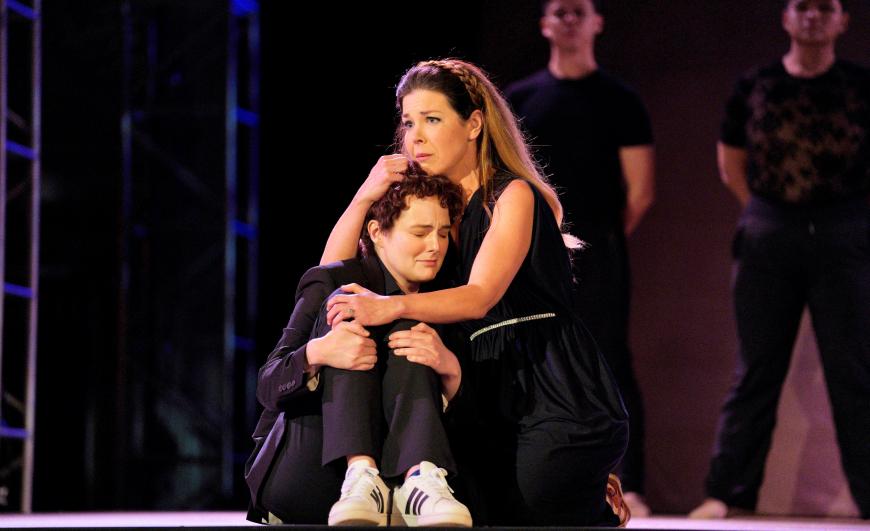
As Ptolemy’s factotum Achilla — lusting for Cornelia and jerked around by Ptolemy — bass Michael Parham brought dignity and depth to the generally unattractive character. Mezzo-soprano Jasmine Johnson played Nirena, Cleopatra’s lady-in-waiting. It’s a small part, but I look forward to hearing more from her.
The eclectic staging by Mark Streshinsky featured laptops and martinis anachronistically mixed with swords and “Roman” armor. At times Handel’s throughlines of character development suffered from the stage action, rife with foreplay and horseplay (reminiscent of West Edge’s raunchy Eliogabalo at the Bruns Amphitheater in 2021). But the staging succeeded in what really counts: making the action clear and keeping the interest of the audience. Streshinsky’s English translations on the screens to the side of the stage were mostly helpful, though a third repetition of “A—hole!” was a bit much.
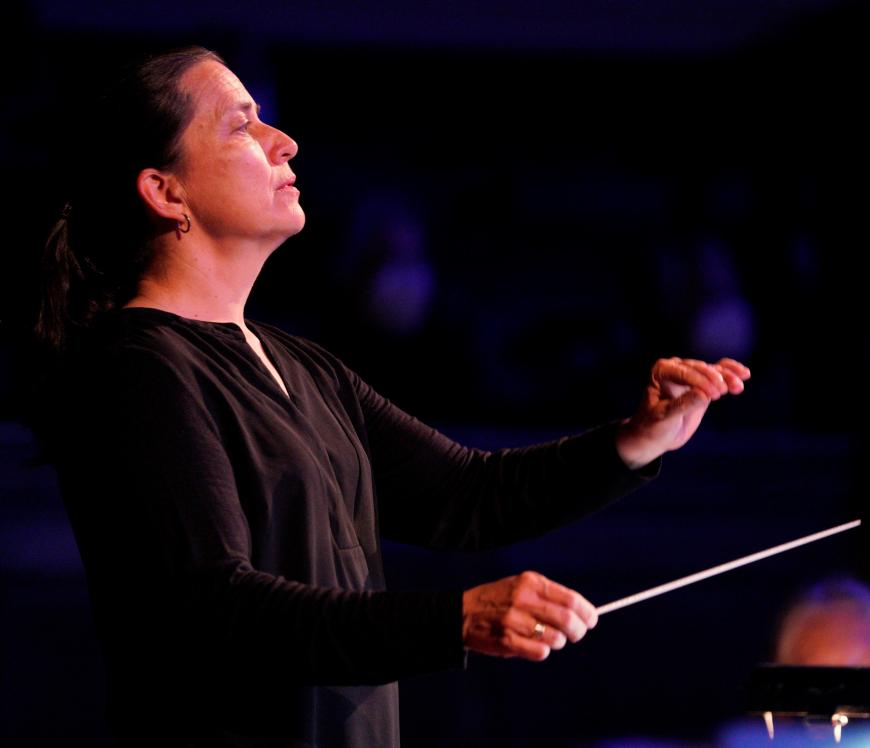
The orchestra was conducted by Christine Brandes — well known locally as a singer and Baroque specialist. Handel’s “orchestral color” tones came across with the occasional addition of recorder, horn, bassoon, and flute to the basic forces of strings, oboe, and continuo. The venue, however, did not help. The cavernous Oakland Scottish Rite Center sucked up much of the sound, leaving the plucked instruments (harpsichord and theorbo) practically inaudible, at least to me in the fifth row of the balcony. They may have been inaudible on stage as well, since the ensemble between singers and instrumentalists was often shaky, especially in the recitatives — the fast-moving sung dialogue. Too often the music slowed to a crawl with unnecessary ritardandos, dissipating the rhythmic energy — a particular problem in an opera with a lot of slow-tempo songs. Brandes and her orchestra were attentive to keeping the instrumental volume down so that the singers could be heard in the problematic acoustics of the hall.
Julius Caesar can be heard once more this Thursday, Aug. 4, followed by performances of the other two operas that round out West Edge’s ambitious and welcome summer festival.



